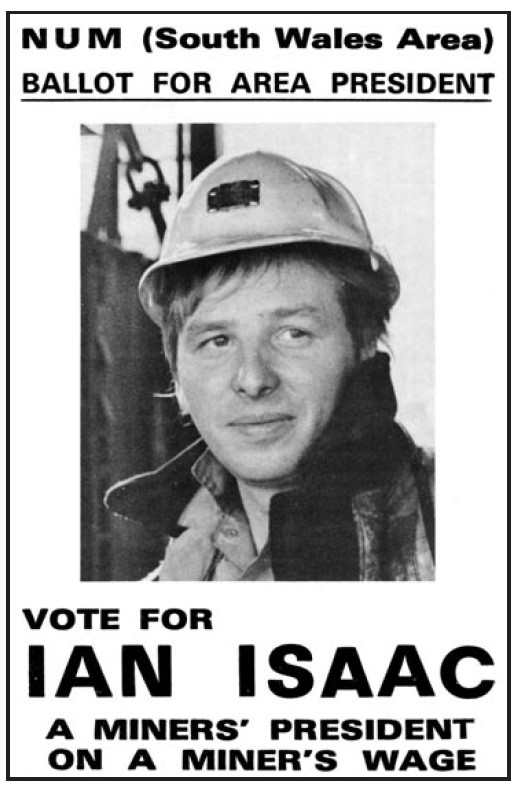 Review: When We Were Miners, by Ian Isaac
Review: When We Were Miners, by Ian IsaacReview by Mike Kennard
Ian Isaac, the author of When We Were Miners, comes from a family steeped in mining traditions and was the Lodge Secretary at St John’s pit in Maesteg in the South Wales coalfield in the period leading up to and during the 1984-5 strike. His book is an account of the historic 1984-85 strike, and although it is told from the personal viewpoint of a Marxist union activist in the South Wales coalfield, it gives an excellent overview of the progress of the strike nationally in that historic twelve month struggle.
It was originally published some time ago, but to mark the fortieth anniversary of the miners’ strike, Ian has brought out a second, updated edition. As Ian describes in the book, that strike was a titanic struggle between the ‘heaviest’ of organised labour’s ‘heavy battalions’ and a Thatcher government bent on breaking the power of the movement.
As Ian explains, the “National” in the title of the NUM is deceptive. The union is in fact a federation of area unions, something that the right wing leaders, before the strike, exploited to bypass national opposition to a bonus/incentive scheme. This meant that in areas where coal extraction was easier – like Nottingham – had higher productivity and bonuses. Thus decades of work to unify the union were set aside in 1977 when the then NUM president, Joe Gormley overrode two national “no” votes to make an agreement subject to area decisions.
This was something that fatally undermined the 1984-85 strike. Ian gives examples of how the incentive schemes created difficulties at both area and individual pit level, with constant arguments with NCB officials and colliery managers. On this issue and many others, Ian brings the issues to life, through his own experences in negotiating and campaigning in Maesteg and South Wales as a whole.
An active campaigner before, during and after the strike
The book is in three sections, the first section examining the background to the strike, the second deals with the strike itself, and the third on the later (unsuccessful) battle to keep St John’s colliery in Maesteg open. Ian makes no bones about the fact that he was not only a militant member of the National Union of Mineworkers, but he was also an active member of the Labour Party, a Marxist, and a supporter of the newspaper Militant.

Ian was an active campaigner before, during and after the strike for a union that was 100% accountable to its members and in that regard he was aligned with other trade unionists who were active in a variety of different trade union ‘broad lefts’. Indeed, there were attempts made to denigrate Ian for his support for the national trade union broad left movement known as BLOC, the Broad Left Organising Committee. BLOC had huge potential and at its peak was able to organise a huge conference of active reps and shop stewards in Sheffield in 1984, addressed by Tony Benn among others.
It is clear from Ian’s description of the strike and its aftermath, both nationally and in relation to the South Wales coalfield, that the whole issue could only be understood in a political context. The Thatcher government was launching an assault on the living standards of working class people, on the industries on which their livelihoods depended, and ultimately on their democratic rights. The strike was a political and a class issue and that stands out a mile in Ian’s book.
Ian was in many ways a model train union activist. He was not always a miner and worked and studied elsewhere, and when he was elected lodge secretary by a large margin in 1978, he was one of the youngest in that position, at only 26 years of age, and he had only been in the collierty four years. It was not your age or experience that counted; what mattered was the appeal you made and the commitments you gave.
Socialists played a key role in the community
Ian recounts how a new leadership developed at St John’s, with younger miners without attachment to the old stale attitudes taking on committee positions. Working with socialists in the community, they played a role in taking up community issues, particularly unemployment and inviting outside speakers to increase political awareness and activity. It was a story repeated in other areas and it was an important backdrop to the strike was to begin in 1984.
Ian was in contact with other left activists in the NUM, establishing a national Broad Left and one of its campaigns was for 5-yearly election of full-time officials. This was eventually was passed in 1983 at the NUM’s National Conference.
The book deals with too many issues to be described in a short review, but if you want a good book that brings to life the struggle of the miners before, during and after the 1984-85 strike, through the eyes of an activist, you can’t go far wrong with Ian’s book. Even the appendices, giving a lot of detail and additional information are very informative.
“Today”, he writes, near the end of the book, “there is a new generation of young trade union organisers who know that the “official” accounts of the strike are distorted and seek to find out the real lessons of the strike. When asked about this, I know there are many lessons to be taken on board and I hope my account has helped add knowledge for that new generation of trade unionists and socialists”.
The book is still available as a Kindle or hard copy edition from Amazon, but you can also contact the author for a copy: ian.isaac@yahoo.co.uk.
You can also watch Ian Isaac’s presentation on the miners’ strike, given to a Left Horizons Zoom discussion meeting, here.
 London bus drivers’ ballot - By Abigail Pollock Across London Covid-19 has radicalised London bus drivers. A new generation of garage-based unions reps is beginning to call for more action
London bus drivers’ ballot - By Abigail Pollock Across London Covid-19 has radicalised London bus drivers. A new generation of garage-based unions reps is beginning to call for more action Academy School tries to break cleaners’ union - UVW press release A press release from the United Voices of the World trade union outlines how the Ark Globe Academy has tried to bribe
Academy School tries to break cleaners’ union - UVW press release A press release from the United Voices of the World trade union outlines how the Ark Globe Academy has tried to bribe UCU members vote to strike - By UCU member As a UCU member in the north of England I am a member of one of the 60 universities which successfully balloted
UCU members vote to strike - By UCU member As a UCU member in the north of England I am a member of one of the 60 universities which successfully balloted ASDA workers fighting for their livelihoods - By Nick Parker, Skipton and Ripon CLP member On Sunday 3rd November, thousands of workers at supermarket giant ASDA face termination of their employment after refusing to
ASDA workers fighting for their livelihoods - By Nick Parker, Skipton and Ripon CLP member On Sunday 3rd November, thousands of workers at supermarket giant ASDA face termination of their employment after refusing to Virgin Care takeover in Lancashire - By Andy Ford, Unite NHS union rep NHS workers in the north-west were dismayed to see that Virgin Health had won a re-run contact process
Virgin Care takeover in Lancashire - By Andy Ford, Unite NHS union rep NHS workers in the north-west were dismayed to see that Virgin Health had won a re-run contact process

